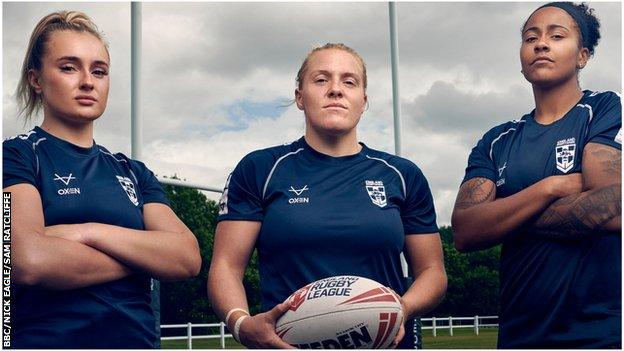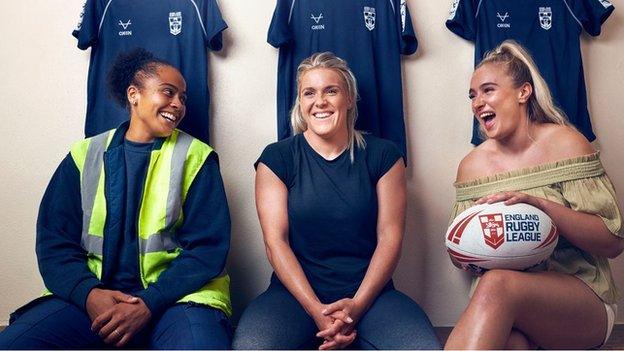Rugby League World Cup: 'It's been a long journey with lots of tears', says Amy Hardcastle
- Published
Women of Steel: England rugby league star Amy Hardcastle shares her story
Watch Women of Steel on BBC iPlayer from Monday 24 October. Also on BBC Two, 21:30 GMT, Monday 31 October. |
Amy Hardcastle is the best rugby league player that you may never have heard of.
At 33, Hardcastle, who plays at centre, is currently England's top scorer with 21 tries in 21 games.
She is also the only player to have won a treble twice within the Women's Super League, which she did when she won the Women's Super League Grand Final, League Leaders Trophy and Women's Challenge Cup with Bradford Bulls in 2017, before achieving the same with St Helens in 2021.
And in 2020, she was the only English player to be named in the National Rugby League women's team of the decade.
Away from achieving incredible success on the pitch, Hardcastle is a mum who has come from a working class background, suffered with anxiety and depression and dedicates her time to a charity, Rugby League Cares.
Next month, she will be playing in her third World Cup. Women's rugby league in England is still not professional.
A fascinating new BBC documentary, Women of Steel, explores the sacrifices that players within the national team have to make to achieve within the sport.
BBC Sport spoke to Hardcastle about her incredible journey.
'Mum had to live on a sofa bed in the living room'
Hardcastle grew up in a village called Copley, in West Yorkshire, where she lived in a two-bedroom flat with her mum, Allison and older brother, William.
She describes some of the sacrifices that her mum, whom she calls her role model, had to make to in order to provide for the family.
"As my brother got older, we needed a bedroom each so, for many years, my mum had to live on a sofa bed in the living room," she revealed.
"She did a lot of cleaning jobs. Now she's working for the NHS and she's an assistant practitioner. It's only been in the last five years that she's been able to buy her first house.
"When she was younger, she was on benefits, bringing up two children on her own and struggling a lot with depression. She's never had it easy and she's just got on with it."
Hardcastle's mum now lives in the house just behind her own and helps to look after Hardcastle's 12-year-old daughter, Olivia, amongst Hardcastle's incredibly busy schedule.
'I'm super proud of how far I've come'
Hardcastle first began playing rugby for Siddal whilst she was studying at college and noticed a poster advertising a women's team.
"I plucked up the the courage and went," she said. "That was massive for me, because I really struggled in new environments.
"There was a union club near where I grew up. I used to knock about with the lads on a Friday. They used to say, 'you're one of the lads, you should get involved'."
Hardcastle played football and other sports.
"With football, I used to give penalties away," she said. "With rugby, I could use my strength, speed and power."
Discovering rugby also gave Hardcastle the focus that she felt she needed at the time.
"When I was 17, I started going out. I'd tell my mum, 'I'm just sleeping at so-and-sos' - when, actually, I was partying. When I started playing rugby, I thought, 'this is what I want to do'."
Aged 20, Hardcastle played her first Test match for England, against France.
"I'm super proud of how far I've come," she reflected.
"It's been a long journey with lots of tears. I've got 21 tries for England, the top try-scorer, a double treble-winner, named in world's best team and team of decade in 2020. As if I've done all this!"

Hardcastle (centre) with England team-mates Paige Travis (left) and Chantelle Crowl
'I struggled with postnatal depression'
Despite all these brilliant achievements, Hardcastle's career hasn't been entirely smooth.
When she was 21, Hardcastle gave birth to Olivia. She had to take time away from rugby, her work as a gym instructor and her degree at Huddersfield University, studying Exercise, Physical Activity & Health.
Hardcastle found motherhood tough.
"I definitely struggled with postnatal depression," she admitted. "I went through a stage where my anxiety got really bad, but I didn't know why it was happening."
Hardcastle said that her anxiety got so bad she couldn't leave the house.
"Every time I got in my car, I felt like I had vertigo - everything was just wishy-washy," she said.
"Panic attacks occurred quite a lot. It's that overwhelming feeling that something drastic is going to happen to you."
Hardcastle says she suffered badly with panic attacks for a couple of years. She still experiences them, but has found ways to manage them.
All this impacted her family and, ultimately, she and her then husband split. She says she tried therapy, but didn't take to it and also didn't want to take medication.

Hardcastle (centre) describes herself as the mum of the dressing room.
Eventually, Hardcastle returned to university after a year, but continued to struggle and finished with half a degree.
She came back to rugby gradually, after six months. By that time, Siddal had disbanded, so Hardcastle joined Bradford Bulls.
'We need rugby league on the map'
Alongside playing for St Helens, Hardcastle was, until recently, working two separate jobs - as a carer for a woman with dementia and as a healthcare assistant in the Accident and Emergency department at the Royal Halifax Infirmary. Playing rugby often meant taking annual leave.
She is now working as a community and welfare officer for charity, Rugby League Cares. Within that role, she helps to deliver education to rugby teams and schools around mental health awareness and wellbeing.
Hardcastle says that things would be simpler if she were able to get a salary for playing rugby. She's hopeful that this World Cup will help broaden the popularity of the women's game and is glad of the traction it's going to get.
"This is another ball game," Hardcastle said. "The BBC are showing all the games. My grandma can watch it. It's class! We need rugby league to get noticed here.
"The Australians are professional. Women's football has set the platform too and look at netball and hockey. We need Rugby League on the map and we need to showcase it at the World Cup."